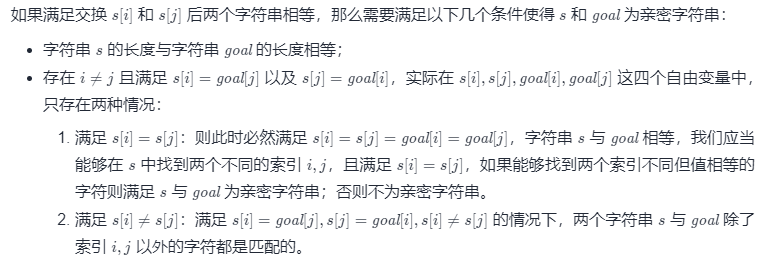
📢 preface
| 🚀 Algorithm problem 🚀 |
- 🌲 Punching out an algorithm problem every day is both a learning process and a sharing process 😜
- 🌲 Tip: the problem-solving programming languages in this column are C# and Java
- 🌲 To maintain a state of learning every day, let's work together to become the great God of algorithm 🧐!
- 🌲 Today is the 103rd day of punching out the force deduction algorithm 🎈!
| 🚀 Algorithm problem 🚀 |
🌲 Sample of original question: intimate string
Give you two strings S and goal. As long as we can get the result equal to goal by exchanging the two letters in s, we will return true; Otherwise, false is returned.
The definition of exchange letter is: take two subscripts I and J (subscript starts from 0) and meet I= j. The characters at s[i] and s[j] are then exchanged.
For example, exchanging elements of subscript 0 and subscript 2 in "abcd" can generate "cbad".
Example 1:
Input: s = "ab", goal = "ba" Output: true Explanation: you can exchange s[0] = 'a' and s[1] = 'b' generate "ba",here s and goal equal.
Example 2:
Input: s = "ab", goal = "ab" Output: false Explanation: you can only exchange s[0] = 'a' and s[1] = 'b' generate "ba",here s and goal Unequal.
Example 3:
Input: s = "aa", goal = "aa" Output: true Explanation: you can exchange s[0] = 'a' and s[1] = 'a' generate "aa",here s and goal equal.
Example 4:
Input: s = "aaaaaaabc", goal = "aaaaaaacb" Output: true
Tips:
- 1 <= s.length, goal.length <= 2 * 104
- s and goal are composed of lowercase English letters
🌻 C# method: Enumeration
Let the two strings be s and goal, where s[i] represents the ith character of S, and goal[i] represents the ith character of goal.
If s[i]=goal[i], we say I is matched, otherwise I is unmatched.
Intimate string is defined as: the ith character s[i] in s needs to be exchanged with the jth character in s, and i =j is satisfied. After exchange, s is equal to goal.
Two strings of intimate strings need to be exchanged once, and two characters with unequal indexes are equal.

code:
public class Solution {
public bool BuddyStrings(string s, string goal) {
if (s.Length != goal.Length) {
return false;
}
if (s.Equals(goal)) {
int[] count = new int[26];
for (int i = 0; i < s.Length; i++) {
count[s[i] - 'a']++;
if (count[s[i] - 'a'] > 1) {
return true;
}
}
return false;
} else {
int first = -1, second = -1;
for (int i = 0; i < goal.Length; i++) {
if (s[i] != goal[i]) {
if (first == -1)
first = i;
else if (second == -1)
second = i;
else
return false;
}
}
return (second != -1 && s[first] == goal[second] && s[second] == goal[first]);
}
}
}
results of enforcement
adopt Execution time: 84 ms,At all C# Defeated 47.14% of users in submission Memory consumption: 37.9 MB,At all C# Defeated 23.70% of users in submission
🌻 Java methods: enumerations
Train of thought analysis
Let the two strings be s and goal respectively, where s[i] represents the ith character of S and goal[i] represents the ith character of goal.
If s[i]=goal[i], we say I is matched, otherwise I is unmatched.
Intimate string is defined as: the ith character s[i] in s needs to be exchanged with the jth character in s, and i =j is satisfied. After exchange, s is equal to goal.
Two strings of intimate strings need to be exchanged once, and two characters with unequal indexes are equal.

code:
class Solution {
public boolean buddyStrings(String s, String goal) {
if (s.length() != goal.length()) {
return false;
}
if (s.equals(goal)) {
int[] count = new int[26];
for (int i = 0; i < s.length(); i++) {
count[s.charAt(i) - 'a']++;
if (count[s.charAt(i) - 'a'] > 1) {
return true;
}
}
return false;
} else {
int first = -1, second = -1;
for (int i = 0; i < goal.length(); i++) {
if (s.charAt(i) != goal.charAt(i)) {
if (first == -1)
first = i;
else if (second == -1)
second = i;
else
return false;
}
}
return (second != -1 && s.charAt(first) == goal.charAt(second) &&
s.charAt(second) == goal.charAt(first));
}
}
}
results of enforcement
adopt Execution time: 2 ms,At all Java Defeated 67 in submission.41%User Memory consumption: 38.4 MB,At all Java Defeated 15 in submission.53%User
Complexity analysis
Time complexity: O(N),among N Is the length of the string Space complexity: O(C),You need a constant space to save the character statistics of the string. We count the number of all lowercase letters, so C = 26.
💬 summary
- Today is the 103rd day of punching out the force deduction algorithm!
- This paper uses C# and Java programming languages to solve problems
- Some methods are also written by Likou God, and they are also shared while learning. Thanks again to the algorithm bosses
- That's the end of today's algorithm sharing. See you tomorrow!
